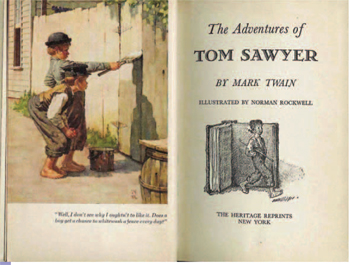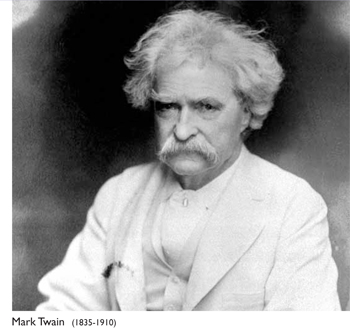
 When Mark Twain was born in Missouri it had been a state for only fifteen years. It gained statehood in 1821, forming part of the western border of the United States. Beyond that border was wild frontier. Some of state's inhabitants owned slaves. Twain's father had one slave and his uncle had several. As a youth he spent time on his uncle’s farm playing in the slave quarters listening to the tall tales they told and spirituals they sang. He remembered the language, the stories, and the people for the rest of his life and populated his books with their dialect. Although later in life, he showed his more serious side, Twain is best known as a humorist. One of his greatest accomplishments was creating a distinctly American writing style that didn’t imitate English writers. His stories replicated American life and speech patterns which was loose and rhythmic. This realistic prose influenced future American writers. Hemingway stated that ALL modern American literature was influenced by the book, Huckleberry Finn.
When Mark Twain was born in Missouri it had been a state for only fifteen years. It gained statehood in 1821, forming part of the western border of the United States. Beyond that border was wild frontier. Some of state's inhabitants owned slaves. Twain's father had one slave and his uncle had several. As a youth he spent time on his uncle’s farm playing in the slave quarters listening to the tall tales they told and spirituals they sang. He remembered the language, the stories, and the people for the rest of his life and populated his books with their dialect. Although later in life, he showed his more serious side, Twain is best known as a humorist. One of his greatest accomplishments was creating a distinctly American writing style that didn’t imitate English writers. His stories replicated American life and speech patterns which was loose and rhythmic. This realistic prose influenced future American writers. Hemingway stated that ALL modern American literature was influenced by the book, Huckleberry Finn.
 Twain's birth name was Samuel Langhorne Clemens. The sixth of seven children, he was born on November 30th, 1835, in Florida, Missouri. The family moved to the river town of Hannibal on the Mississippi River when Samuel was four years old. It was there he experienced the colorful and exciting life of living on a thriving river town. Steam boats docking at the town's wharf brought slave dealers, gamblers, singers, a virtual cornucopia of river travelers, all which would fuel his young imagination. It was also in Hannibal where he first experienced working in a print shop. His father had died in debt when Samuel was eleven years old. Shortly afterwards he left school, having completed the fifth grade, and went to work. In print shops. As he set the type he got to read the news stories from around the world. At the age of sixteen he started to help his older brother, Orion, in producing a newspaper, The Hannibal Journal. For several years he contributed poems, humorous sketches, and reports.
Twain's birth name was Samuel Langhorne Clemens. The sixth of seven children, he was born on November 30th, 1835, in Florida, Missouri. The family moved to the river town of Hannibal on the Mississippi River when Samuel was four years old. It was there he experienced the colorful and exciting life of living on a thriving river town. Steam boats docking at the town's wharf brought slave dealers, gamblers, singers, a virtual cornucopia of river travelers, all which would fuel his young imagination. It was also in Hannibal where he first experienced working in a print shop. His father had died in debt when Samuel was eleven years old. Shortly afterwards he left school, having completed the fifth grade, and went to work. In print shops. As he set the type he got to read the news stories from around the world. At the age of sixteen he started to help his older brother, Orion, in producing a newspaper, The Hannibal Journal. For several years he contributed poems, humorous sketches, and reports.
Yearning to travel, Twain explored the United States using his printing skills in various cities. Having made plans at the age of twenty-two to go to South America, he was traveling down the Mississippi towards New Orleans when he instead made a momentous choice. He asked a riverboat pilot to teach him the skills of riverboating. In two years, Samuel was a licensed riverboat pilot. It paid well and he acquired yet more experiences, characters, and stories. When the civil war broke out in 1861, river traffic stopped and so did Clemens career as a pilot. He came away from the river with his pen name, MARK TWAIN, a phase used when measuring water depth. Mark Twain meant "two fathoms" (a depth of twelve feet.)
Twain joined a volunteer Confederate unit in the Civil War but quit after two weeks and traveled to Nevada where his brother Orion was working. Traveling by stagecoach across the frontier from Missouri to Nevada he encountered adventures, characters and had his first experience with Native American Indians.
He first used the pen name Mark Twain in Nevada writing for the Virginia City, Territorial Enterprise. Twain describes his times in Nevada, and his attempts to mine for gold and silver, in ROUGHING IT (1872). It was during this time he concluded he was better suited for newspaper journalism than mining for gold. Moving father west, to California, he wrote for the San Francisco, Morning Call, and a literary journal, the Californian. In 1866, his first popular story, THE CELEBRATED JUMPING FROG of CALAVERAS COUNTY, appeared in the New York, Saturday Press, a story he had heard while mining for gold. Later, he continued even farther west, and traveled to the Hawaiian Islands, while a correspondent for the Sacramento, Union.
His lust for travel never left him. At the age of 32, he took a voyage to Europe on the steamship Quaker City. The letters he wrote on this trip, both to a paper in San Francisco, and one in New York, were collected into a popular book, INNOCENTS ABROAD (1869). It was on this steamship that Twain met the brother of the women he was to marry, Olivia Langdon. It was said he saw her photo and fell in love at first sight. Following a brief stint writing for a newspaper in Buffalo, New York the young couple moved to Hartford, Connecticut, in 1871. They had a young son that died in infancy. They also had three daughters Suzy, Clara, and Jean. The family spent 20 years in Hartford, moving into a luxurious new 19- room house, where they entertained many prominent authors of the day. These were prolific and prosperous times for the Twain family. He wrote most of his best work during these years including:
The Guilded Age (1873)
The Adventures of Tom Sawyer (1876)
A Tramp Abroad (1880)
The Prince and the Pauper (1882)
Life on the Mississippi (1883)
Adventures of Huckleberry Finn (1884), and
A Connecticut Yankee in Arthur's Court (1889).
Adventures of Huckleberry Finn is considered by most to be Twain's greatest work. He had begun the book in 1876 as a sequel to Tom Sawyer. Huck is the son of the town drunk. The story chronicles the adventures of runaways Huck and a black slave, Jim, told from the viewpoint of Huck. The book was and still is - controversial. Much of the controversy is due to Hunk's language. Twain used dialects and made the conversation realistic using careless grammar and wording. Many object to this language and to Huck's careless morals. The book was banned from some libraries. Many readers today, find Huck's casual acceptance to the principles of slavery, and his use of racial stereotypes, abhorrent. The intrinsic theme of the story, however, is about the fundamental equality and aspirations of all races.
Although his days in Hartford had been successful, he had started his own publishing company investing heavily in an elaborate typesetting machine. Twain lost money and his publishing company had to declare bankruptcy. He found himself humiliated and unable to pay his debts. Eventually he recovered financially by continuing to write and doing a lecture tour around the world. By the time he and his family returned to the states, he was an international hero, with a showy image of wearing unconventional white suits and smoking a cigar or pipe. He also used his position to criticize the U.S. foreign policy. His anger grew against imperialist countries, declaring himself an - anti-imperialists. He continued to be one throughout his life.
Although his financial life was beginning to recover, his personal life began to un-ravel. In 1896, his cherished daughter Suzy who had returned from the trip to visit the Hartford house - died while there. The rest of the family was still in Europe. They sold the house. His wife, Olivia died in 1904, and his youngest daughter, Jean died in 1909. He somehow continued to write but his writing turned dark. He focused on human greed and cruelty seeming more and more pessimistic and decrying all human motives as ultimately selfish. One of his lighter works, a play that had been published, IS HE DEAD? was rediscovered and published in 2001.
Whether his life ended on a happy note is not the question. He had a fruitful life and is often quoted. No one can deny his wonderful wit or contribution to American literature. He was the innovator of writing like Americans spoke. Living in the Bay Area, I'm sure we all hear this quote of his every summer. "The coldest winter I ever spent was a summer in San Francisco". Ironically, this has never been proven to be a quote of Twain’s. But then, it hasn't been proven not to be - so we can still use it. I would speculate Twain would say, "Well, if I didn't say it, I should have."